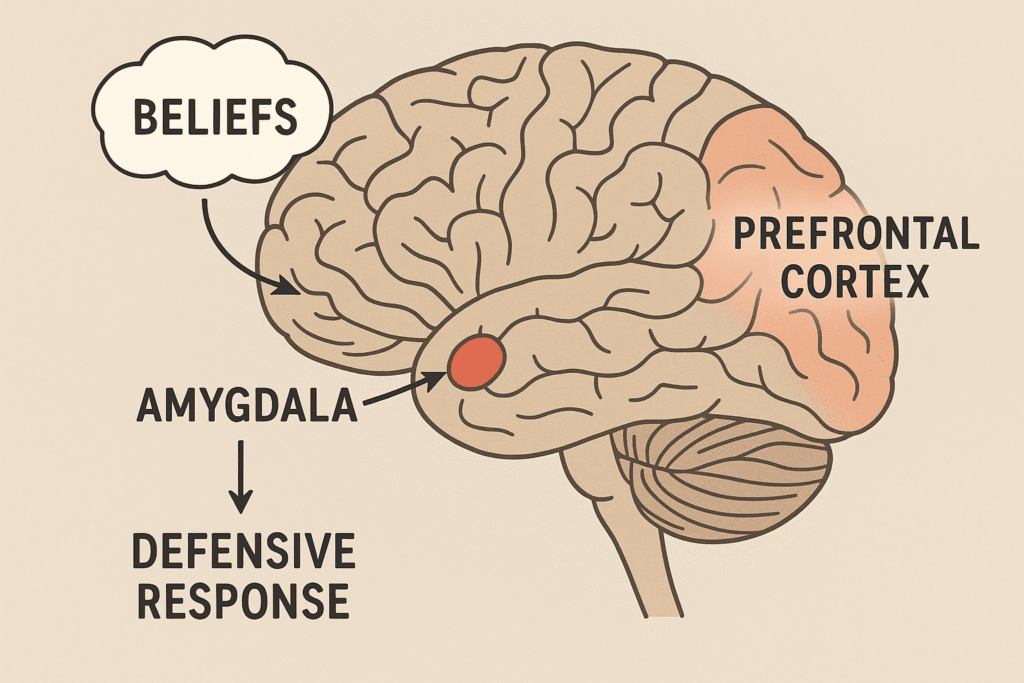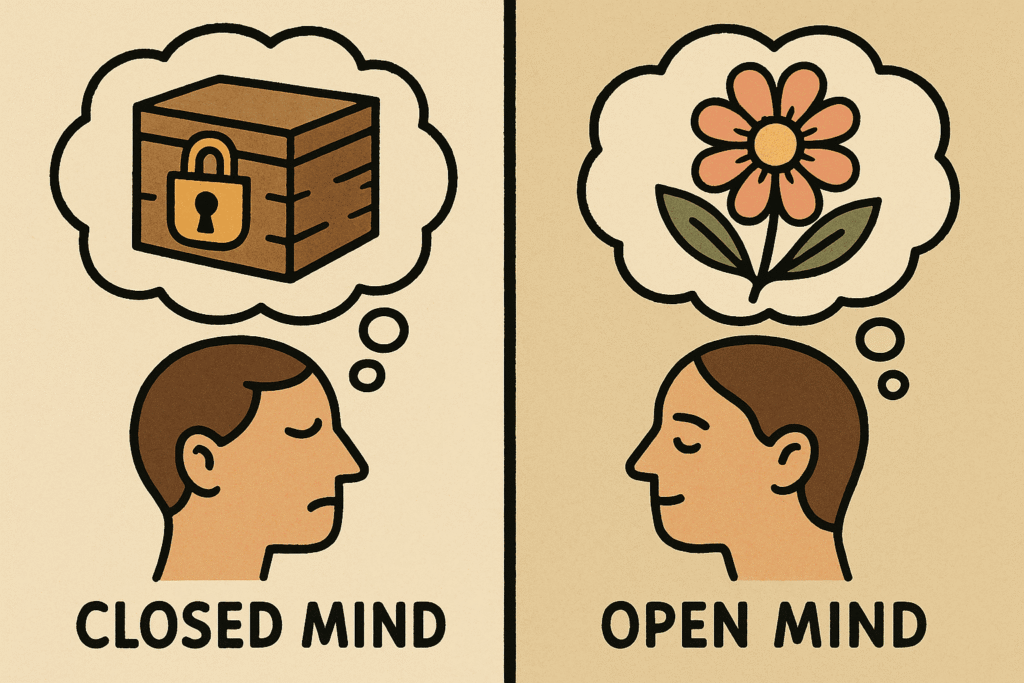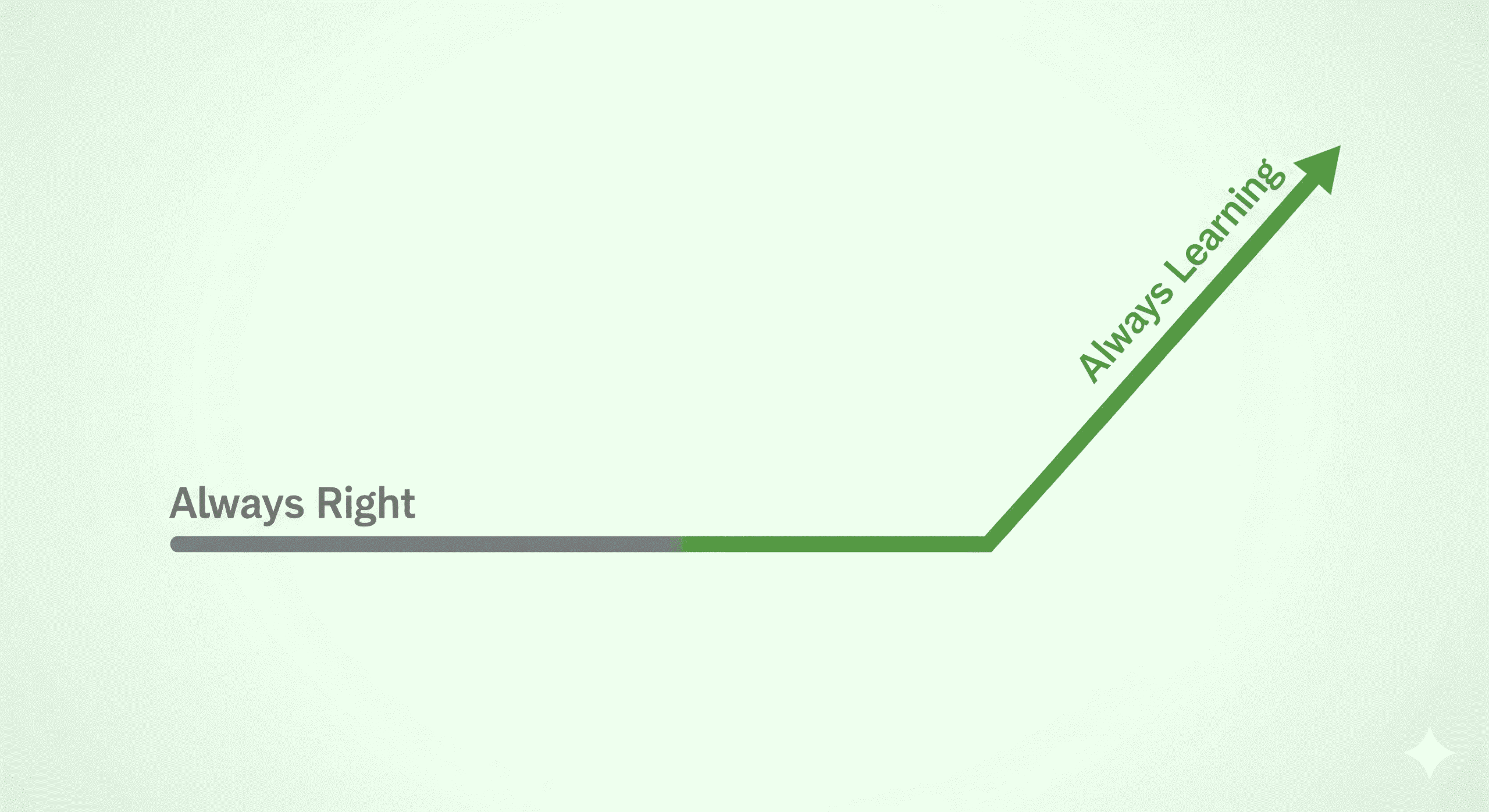What if I told you that the number one thing killing your growth, development, and advancement isn’t lack of skills, resources, or opportunities? It’s something far more subtle and dangerous: your desperate need for being right.
Before you start thinking about that colleague who always has to have the last word, pause for a moment. We ALL do this. It’s hardwired into our brains, and it’s quietly sabotaging our success in ways we don’t even realize.
This isn’t just about ego—it’s about survival. Your brain will vehemently protect what you believe to be true, whether it’s actually true or false. This protective mechanism that once kept our ancestors alive is now the very thing preventing us from thriving in our complex, rapidly changing world.
What Does “Having to Be Right” Really Mean?
Your Brain’s Protective Programming

Here’s the uncomfortable truth: your brain has unconscious filters that work like selective glasses. Your eyes will only see what your brain is looking for. We view everything through a particular lens, and that lens may be completely distorting reality.
This is why wars happen, why battles occur, why simple disagreements escalate into relationship-ending fights. Your unconscious mind treats challenges to your beliefs as threats to your survival, triggering defensive responses that shut down learning and growth.
Your brain will dismiss any information that contradicts what you “know” to be true—whether that dismissal helps or hurts you. This happens automatically, below the level of conscious awareness, making it incredibly difficult to catch and correct.
The Hidden Costs of Always Being Right
When Expertise Becomes Your Prison
The more expertise you develop, the more dangerous this trap becomes. Highly educated individuals, experts, leaders, teachers, and managers often fall hardest into this pattern because they have more invested in being right.
But here’s what research shows: the primary way we shut down all learning is by insisting on being right at all costs.
The Professional Price You’re Paying
When you must always be right, you unconsciously:
- Reject innovative solutions that don’t fit your existing framework
- Miss market shifts that contradict your expertise
- Stifle team creativity by dismissing unfamiliar ideas
- Create defensive cultures where people stop sharing insights
- Become obsolete as change accelerates around your rigid thinking
The Personal Cost of Rightness Addiction

Relationships suffer when you prioritize being right over being connected:
- Conversations become competitions instead of collaborations
- Others stop sharing ideas because they expect dismissal
- Trust erodes when people feel unheard and invalidated
- Learning stops when you signal that you already know everything
The Onion Story: A Perfect Metaphor
When Being Right Becomes Self-Destructive

Consider this powerful example: A little girl saw her mother peeling what she thought were apples, but they were actually onions.
“Mom, I want an apple,” she insisted.
“Sweetie, these are onions,” her mother explained.
“No, I want an apple!”
After several exchanges, her mother said, “Okay, go ahead, take one.”
The girl bit into the onion. Her eyes immediately started tearing. She KNEW she was wrong. But instead of admitting her mistake, she kept eating the entire onion because she couldn’t bear to be wrong.
This seemingly innocent example perfectly illustrates what we adults do every day. How often do we keep “eating the onion”—persisting in harmful behaviors or wrong decisions—simply because we can’t admit we made a mistake?
The Framework for Staying Open
The “What If I’m Wrong?” Revolution

The antidote to rightness addiction is cultivating intellectual humility through one simple question: “What if I’m wrong?”
This doesn’t mean becoming wishy-washy or lacking confidence. It means holding your beliefs with appropriate strength while remaining curious about new information. You can be confident in your current understanding while staying open to updates and improvements.
The Curiosity Protocol: A Practical System
When someone presents information that challenges your beliefs:
Step 1: Pause Before Defending
- Recognize the defensive impulse without acting on it
- Take a breath and remind yourself that being wrong isn’t dangerous
- Remember that learning requires temporary discomfort
Step 2: Ask Curious Questions
Instead of “That’s wrong,” try:
- “That’s interesting, tell me more”
- “What research supports that perspective?”
- “Help me understand how you reached that conclusion”
- “What evidence would change your mind?”
Step 3: Investigate Together
- Look for credible sources that explore different angles
- Discuss the quality of evidence rather than just opinions
- Consider multiple perspectives before drawing conclusions
- Update your beliefs based on the best available evidence
Frequently Asked Questions About Intellectual Humility
Q: How do I balance confidence with being open to being wrong?
A: Confidence and intellectual humility are complementary, not contradictory. Think of your knowledge like software—the core program is reliable, but regular updates make it better. You can be confident in your current understanding while welcoming information that might improve it.
Q: Won’t admitting I might be wrong make me look weak as a leader?
A: Research consistently shows the opposite. Leaders who demonstrate intellectual humility build more trust, encourage innovation, and create psychologically safe environments. Your team doesn’t need you to be infallible—they need you to be real, growing, and committed to the best outcomes.
Q: What if I genuinely have more expertise than others in the conversation?
A: Use your expertise to ask better questions rather than just provide answers. Often, people with less technical knowledge notice patterns or ask questions that experts miss due to their deep familiarity with the subject. Fresh perspectives can reveal blind spots in expert thinking.
Q: How do I handle situations where someone is sharing obviously false information?
A: You can provide accurate information while remaining curious about the source of their beliefs. Understanding why someone holds a particular view often reveals important insights about communication, trust, or underlying concerns that pure fact-correction misses.
Q: Won’t this approach slow down decision-making?
A: Initially, yes—but the quality of decisions improves dramatically. The time invested in considering multiple perspectives prevents costly mistakes and often reveals better solutions. Fast wrong decisions are far more expensive than slightly slower right ones.
The Science Behind Intellectual Humility
Neuroplasticity and the Growth Mindset

Neuroscience research reveals that our brains remain changeable throughout our lives, but only when we deliberately expose them to new challenges and perspectives. People who regularly question their assumptions literally develop more neural pathways and greater cognitive flexibility.
The most successful learners understand what researchers call the “confidence-knowledge paradox”: the more you truly know about any subject, the more you realize how much you still don’t know. This keeps them hungry for learning while others get trapped in the illusion of complete knowledge.
The Dunning-Kruger Effect in Leadership
The Dunning-Kruger effect shows how people with limited knowledge overestimate their competence. But there’s a flip side: true experts often underestimate their knowledge relative to others. The sweet spot is confident humility—knowing what you know while staying curious about what you might be missing.
Building a Culture of Intellectual Curiosity
Organizational Transformation

Organizations that embrace intellectual humility consistently outperform those that don’t. They create environments where:
- Mistakes become learning opportunities rather than career-limiting events
- Questions are valued more than having immediate answers
- Diverse perspectives are actively sought and integrated
- Changing your mind based on new evidence is celebrated as wisdom
Personal Development Strategies
To maintain intellectual humility in your daily life:
- Seek out sources that challenge your existing viewpoints
- Engage regularly with people from different backgrounds and industries
- Practice saying “I don’t know” or “I hadn’t considered that perspective”
- Keep a learning journal to track how your understanding evolves over time
- Ask for feedback from people who see things differently than you do
The Compound Effect of Embracing Being Wrong

Personal Transformation Benefits
People who develop intellectual humility experience:
- Accelerated learning through openness to new information
- Enhanced relationships through genuine curiosity about others
- Increased creativity through cognitive flexibility
- Better decision-making through consideration of multiple perspectives
- Reduced stress from not having to defend every position
Professional Advantages
In professional settings, intellectual humility leads to:
- Faster innovation by integrating diverse perspectives
- Stronger team performance through inclusive decision-making
- Greater adaptability to market changes and disruptions
- Enhanced leadership credibility through demonstrated growth mindset
- Better customer insights through genuine curiosity about needs
The Path Forward: Choose Growth Over Being Right
Your Moment of Choice
Every day, you face a fundamental choice: you can be right, or you can be growing. You rarely get both simultaneously. Science advances, markets shift, new research emerges. Your willingness to stay curious determines whether you evolve with new discoveries or get stuck defending positions that no longer serve you.
The most successful people aren’t those who are never wrong—they’re those who learn fastest from being wrong. They understand that in our rapidly changing world, the ability to update beliefs based on new evidence isn’t just helpful; it’s essential for survival and success.
Your Implementation Strategy
Start with these concrete steps:
Week 1: Awareness Building
- Notice your defensive reactions when beliefs are challenged
- Count how many times you say “I know” vs. “I wonder”
- Observe conversations where you’re trying to win vs. trying to learn
Week 2: Question Development
- Practice asking “What if I’m wrong?” daily
- Replace corrections with questions when possible
- Seek out one source that challenges your views on an important topic
Week 3: Evidence Gathering
- Research claims that contradict your beliefs
- Ask people for their reasoning behind different viewpoints
- Look for high-quality evidence from multiple sources
Week 4: Belief Updates
- Identify one belief you’ve modified based on new evidence
- Share your learning with someone else
- Celebrate the growth that comes from being wrong
The Bottom Line: Your Invitation to Lifelong Growth
The invitation is simple but profound: be open and keep learning, and you’ll grow for the rest of your life. You can shut that down instantly by insisting on being right, becoming a know-it-all, or taking a “my way or the highway” approach.
Instead, choose curiosity. Choose openness. When you encounter information that challenges your beliefs, ask yourself: “Is this evidence I should consider, or am I just defending my ego?” Do the research. Investigate. Stay curious.
This approach becomes a metaphor for your entire life: be curious and be open, and you’ll always be growing and learning. In a world of rapid change, this isn’t just a nice-to-have quality—it’s the difference between thriving and becoming obsolete.
Remember: being confident in what you know while remaining curious about what you might be missing isn’t weakness—it’s wisdom. It’s the secret to sustained success in an uncertain world.
Your challenge this week: Identify one strong belief you hold and actively seek out three credible sources that present different perspectives. The growth you experience might surprise you and change everything about how you see the world.
The choice is yours. Will you be right, or will you be growing?





